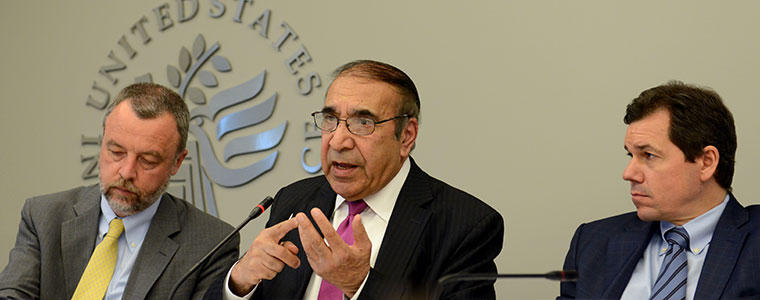Can Afghanistan Stabilize as U.S. Forces Plan Their Exit?
USIP Experts Examine Afghan Crisis and Next Steps
Read the Event CoverageUSIP experts convened on June 16 to discuss that question, offer updates from a just-concluded visit to Afghanistan, and explore how to help Afghans seize what may be missed opportunities to stabilize their country.

The United States’ current policy in Afghanistan mandates a “responsible withdrawal” of U.S. forces by January 2017, when President Obama leaves office. With 18 months to go, a sense of crisis is mounting in Afghanistan as the economy sags, Taliban attacks increase, and the eight-month-old unity government remains deadlocked. Afghanistan’s instability has led policy specialists, commentators and other public voices to question whether enough progress can be made to let Afghanistan succeed if the U.S. withdrawal is conducted as planned.
Neither the international community nor Afghanistan’s divided political elites want to see the Afghan government fail. And the government has made some promising—if unfulfilled—initiatives, such as stronger anti-corruption efforts and an attempt to work with Pakistan against insurgents in both countries.
USIP’s experts on the region discussed both the perils of the situation and opportunities for improving it that have not been fully grasped.
USIP’s Dr. Andrew Wilder, moderated the discussion, having just returned from Afghanistan and Pakistan. Former Afghan Minister of the Interior Ali Jalali addressed security issues. Dr. William Byrd, former Afghanistan Country Director at the World Bank, spoke on the economic and fiscal issues. Scott Smith analyzed the function and dysfunction of the national unity government, and Moeed Yusuf discussed at the prospects of President Ghani’s outreach to Pakistan and his attempt to reach a peace deal with the Taliban. Continue the conversation on Twitter with #AfgStabilization.
Speakers
- Dr. William Byrd
Senior Expert in Residence, USIP
- Ali Jalali
Former Minister of the Interior of Afghanistan
Senior Expert in Residence, USIP
Distinguished Professor, NESA, NDU
- Scott Smith
Director, Afghanistan and Central Asia Programs, USIP
- Dr. Moeed Yusuf
Director, South Asia Programs, USIP
- Dr. Andrew Wilder, Moderator
Vice President, Center for South and Central Asia, USIP



